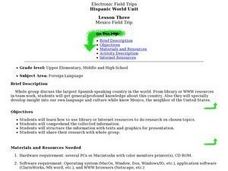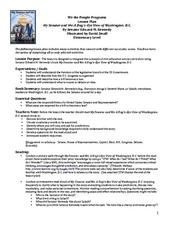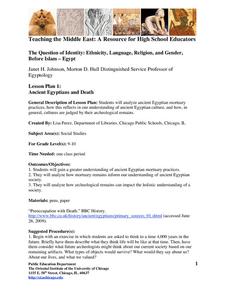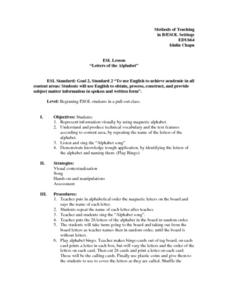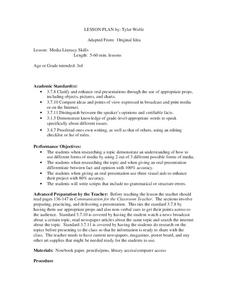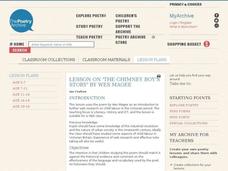Curated OER
Mexico Field Trip
Explore how the library or Internet resources function as textual information. Young writers research a chosen topic then read and comprehend the collected information. They structure the information with texts and graphics for a...
Curated OER
My Senator and Me: A Dog's-Eye View of Washington, D.C.
Although this legislative process lesson is designed to accompany a specific text, it is valuable independently. Young learners participate in a picture walk (worksheet included) through My Senator and Me: A Dog's-Eye View of Washington,...
University of Chicago
Ancient Egyptians and Death
What archaeological evidence remains of ancient Egyptian burial and mortuary practices, and what can this information tell us about ancient Egyptian society?
Curated OER
Shorten the Length
Learn how to summarize by identifying main ideas and supporting details. Readers cross out unimportant information as they read through a text. Is it a random detail? Cross it out! They then draw a concept map, placing the main idea in...
Curated OER
Finding and Authenticating Online Information on Global Development Issues
Students discover how to find authoritative resources. For this research skills lesson, students examine strategies for using the Internet effectively to research global development issues.
Curated OER
Let's Look at Legends: Oregon quarter reverse
Analyzing historical legends is a fun way to develop critical-thinking skills. Pupils will use a graphic organizer to compare and contrast two historical legends relating to volcanoes. While this lesson focuses on the image of Crater...
Curated OER
Reading With Fluency And Expression
Practice makes perfect, and this lesson provides a rubric to prove it! To improve their ability to read with fluency and expression, readers listen to a series of online stories in order to hear how a well-read story should sound. They...
Curated OER
Anticipation Guides Improve Reading Comprehension
Beginning with anticipation guide strategies is a powerful method for improving reading comprehension. First, list initial ideas for a topic the class will be reading about. These ideas are formulated into statements, some of which are...
Curated OER
ESL Lesson - Letters of the Alphabet
Students visually represent information by using magnetic letters of the alphabet and understand and use technical vocabulary. They are able to repeat the name of the letters and sing the "Alphabet Song". They show what they have learned...
Curated OER
Media Literacy Skills
You're on camera! Third graders find a news story and research it to get more information. Everyone uses their found information to write a script and create their own news broadcast!
Curated OER
Perceptions of German Unification Over Time
Through a series of readings and handouts, learners will study the shifts in perception that followed the fall of the Berlin Wall. The history lesson focuses on periods of change in post WWII German history that led to a changed...
Novelinks
Where the Red Fern Grows: Anticipation Guide Strategy
How do you rise above your challenges? This is a question the anticipation guide for Where the Red Fern Grows answers. Full of questions and direct statements about themes of the text, pupils investigate whether or not the writer would...
Curated OER
Mapping Out the Story
Discuss the reading comprehension strategy of summarization with your elementary schoolers! They read a chapter from their social studies textbook, Regions Near and Far, and create a map, or word web, for the chapter. They identify...
Curated OER
Finding Your Way in the World Wide Web
Researchers practice grouping items to explore the concept of a database. They apply these concepts to the WWW search engine format and consider why it is important to enter the most specific information.
Curated OER
Identify Intended Media Messages
How does media convey different messages? Use this lesson to explore media by identifying and analyzing selected images. Middle schoolers analyze a poster and discuss the intended meaning of the imagery and how it makes them feel. They...
Curated OER
Exploring Biomes Lesson 3: Endangered Biomes
Future environmental scientists compare data from two different conservation strategies. Alone this lesson is sufficient, but as part of the Exploring Biomes unit produced by the Arizona Fish and Game Department, it becomes top-notch.
Curated OER
Lesson on 'The Chimney Boy's Story' by Wes Magee
Wes Magee's poem "The Chimney Boy's Story" about chimney sweeps/climbing boys is used as an introduction to a lesson that asks groups to research child labor in Victorian Britain.
Curated OER
News Quiz | April 30, 2012
You can't take this online quiz until after you've read the April 30, 2012 edition of the New York Times. After scanning the articles from the paper, your class can answer each of the five questions. A good way to stay informed on what's...
Curated OER
News Quiz | Jan. 17, 2012
Read to get informed! Kids scan a copy of the New York Times from January 17, 2012 to answer five multiple choice questions.
Curated OER
News Quiz; Dec. 1, 2011
Build a classroom of informed citizens. Pupils read or scan several articles from the December 1, 2011 New York Times, then answer five related multiple choice questions. Great for primary source analysis.
Curated OER
News Quiz: April 18, 2012
After reading several New York Times articles posted on April 18, 2012, kids take a quiz. They read the articles found in that paper, then take a six-question multiple choice quiz. A great way to teach kids how to become informed citizens.
Curated OER
News Quiz | Feb. 3, 2012
What do you do with a New York Times? Read it of course! Your class reads the Times published on February 3, 2012 to answer five multiple choice questions. Who has an informed class? You do!
Curated OER
People are People
Explore human diversity in this human rights instructional activity. Middle schoolers compare novels, speeches, videos, and short stories that promote diversity and basic human rights. They complete daily coursework as they read the...
EngageNY
Conducting Research: Asking and Answering our Questions about Rainforest Arthropods
Let's ask an expert. Scholars divide into groups to research and become experts on either ants or butterflies. Learners use task cards and text on their topic to complete a note catcher. At the end, they share their information with a...


